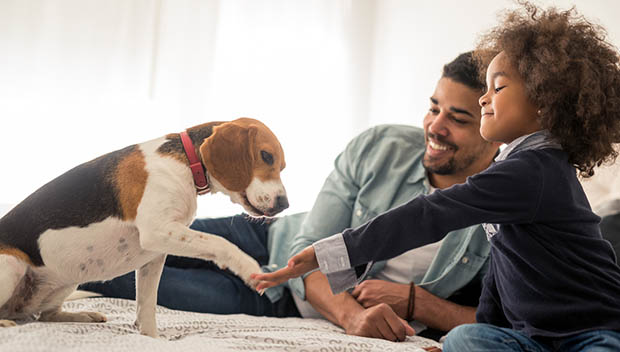
As we're all spending more time at home lately, you might have found your child asking for the dog, cat or pony of their dreams. While adopting a pet is a big decision, you may be entertaining the idea of adding a new pet to the family—maybe to help build your child's sense of responsibility or help keep your family more active. Whatever's sparking your family's "what pet will we choose" discussions, there are a number of things to consider when making such a big decision.
Before choosing what type of animal (a bird versus a goldfish or a dog) and what variety or breed (a Chihuahua versus a Labrador) to adopt, keep these points in mind to make sure you make the right decision for both your new pet and your family.
We won't get into the details of choosing for you—a dog or a parrot is up to you! But if you're really at a loss, taking a step back and looking at your situation/circumstance and resources can help narrow your list and find your perfect match.
When choosing a pet, it is valuable to consider adopting from your local animal shelter or responsible breeders. Take your time and enjoy the process!
Commitment
Obviously adopting a pet isn't like buying the latest video game system or the season's toy fad (surely there are toys in every home that our kids had to have that are now collecting dust somewhere). Adopting a pet often means years of commitment and requires the same love and care as the "newness" wears off and the responsibilities (see below) set in. Keep this in mind as you pick a pet for your family—a rat lives about two years, but a tortoise can live over 100!Responsibilities
There's a big difference between caring for a goldfish and caring for a dog. While changing the water in the fish bowl would need to happen every one to two weeks, there's minimal responsibilities when it comes to caring for a goldfish outside of adding a pinch of food to their bowl every morning. A dog, cat or any kind of livestock demands more, from grooming and clean-up to daily feedings to exercise.Cost
The costs of owning a pet don't stop once you've paid for the adoption fees (this can vary dramatically if you adopt from a shelter or a breeder)—that's just the beginning. Pets can be expensive once you include the cost of their food, their vet bills (check-ups, injuries, required vaccinations) and their licensing. Don't forget about the other costs to improve their quality of life, too: fun toys to keep them entertained, obedience training and regular grooming.Climate
This point is one of the most overlooked on the list, but it's one of the most important when selecting a pet for you and your family. Naturally, some pets are better suited for different climates than others. If you live in a hot desert, a husky who was bred to live in cold, snowy climates won't be as happy as a tortoise who thrives in the dry heat. Be mindful of where you live and the year-round weather, especially during the extreme seasons.Exercise
If you're a family who enjoys hikes, neighborhood walks and other adventures, then it's pretty easy to look straight to active pets like horses or dogs. If your budget and/or living situation doesn't warrant a horse (more on this below), then you've walked straight into the giant question of what breed to go with for a four-legged companion. Not all dogs are suited for far-flung adventures—some prefer short walks and curling up on the couch (the inverse is also true, a dog who needs more exercise won't be happy with a stagnant lifestyle), so research the breeds you're interested in before you make a decision.Time
While things are a bit different now with everyone staying at home, it might seem like a good time to pick a more "needy" pet who requires a bit more attention. But once life goes back to normal, how much time will your family have to spend with the pet? Do you work long hours at the office? Is your family always gone on the weekends for games and competitions? Consider how often you will be able to interact and socialize with the pet, and be sure to adopt one that fits into your family's lifestyle.Space/Setup
No matter the type of pet you choose, make sure you have the right environment where it can thrive and be happy. For example, if your family picks a dog, make sure the yard has plenty of room to run around and a well-built fence so it can't escape and get lost (if you don't have a yard, a dog might not be the best option). If you pick a bird, make sure it has a more than big enough cage with engaging toys to keep it entertained.Allergies
Finally, the hardest thing would be to bring a pet home and later find that sneezing, itching and watery eyes have befallen a family member. To avoid this, be sure that everyone in your family has had a chance to expose themselves to whatever pet variety you've selected (particularly common allergies like dogs and cats) for prolonged periods of time before you open up your hearts and home to your new furry friend. If it so happens that you or your kids are allergic, there is no need to fear—a number of breeds of dogs and cats are hypo-allergenic with hair rather than fur. It does not have to be a choice between allergy medicine and congested misery or a furry family companion, but knowing whether or not this applies to you and your family will help you narrow your options and decide.
READ THIS NEXT: 17 Paw-fect Dogs for Runners









Discuss This Article